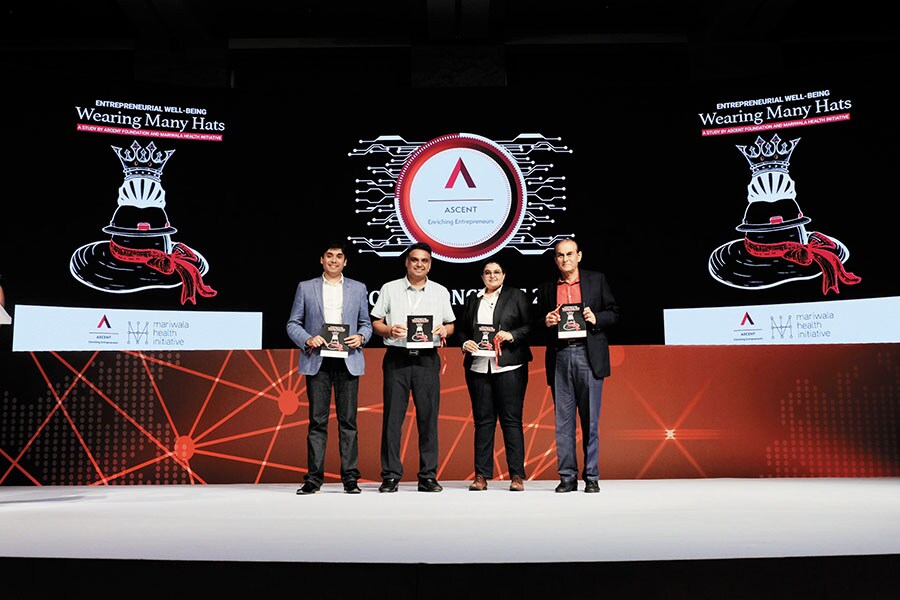Studying how entrepreneurship affects mental health
With the Mariwala Health Initiative leading a discussion on mental health for business leaders, director Rajvi Mariwala talks about the next steps


 Harsh Mariwala (right) and Rajvi Mariwala (second from right) at the Ascent Conclave[br]The fourth edition of the Ascent Conclave, organised by the Ascent Foundation in November in Mumbai, was much more than a gathering of about 600 entrepreneurs and industry experts this year was the first time the Foundation delved into the issue of mental health and, along with the Mariwala Health Initiative, launched a study titled Entrepreneurial Well-being. “We realised that mental health is not a conversation that is being done actively in the space of entrepreneurship. This led to the idea of doing a study,” says Archanna Das, head of Ascent Foundation.
Harsh Mariwala (right) and Rajvi Mariwala (second from right) at the Ascent Conclave[br]The fourth edition of the Ascent Conclave, organised by the Ascent Foundation in November in Mumbai, was much more than a gathering of about 600 entrepreneurs and industry experts this year was the first time the Foundation delved into the issue of mental health and, along with the Mariwala Health Initiative, launched a study titled Entrepreneurial Well-being. “We realised that mental health is not a conversation that is being done actively in the space of entrepreneurship. This led to the idea of doing a study,” says Archanna Das, head of Ascent Foundation.
The study brought to light major stress issues for leaders and business owners: Cash flow, management of teams, and the fear of failure. Harsh Mariwala, chairman of Marico, and founder of Ascent Foundation and Mariwala Health Initiative, said, “It is the most neglected part of health care in India. If looked at proactively, mental health issues can be addressed through counselling, supportive peers, families and communities. But when neglected, the stigma itself can prevent persons from reaching out for support which has lifelong and widespread consequences.”
The conclave also included conversations on the theme of ‘Rewiring for Resilience’ and how leaders handle adversity and a panel discussion of young entrepreneurs. Rajvi Mariwala, director of the Mariwala Health Initiative, spoke to Forbes India:
On the structure and methodology:
Entrepreneurship as a phenomenon is really well studied, but there is nothing on the mental health and well-being of entrepreneurs. So far, in India, most conversations revolve around workplace mental health for employees, but there are very few that focus on the mental health of the leaders of the enterprise. This study is unique as it has been co-designed by entrepreneurs and mental health practitioners, and challenges the conventional paradigms of social research by focusing on the experiences of entrepreneurs rather than having a diagnostic view.
On the results of the study
Entrepreneurial mental health should be looked at not just as an individual issue, but as something that affects the whole organisation. In terms of the results, 40 to 45 percent of respondents said they experience anxiety, anger, frustration, irritation sometimes, another 35 to 44 percent said they experience it often or very often. These are pretty high numbers and would lead to a burnout. How do we look at mental well-being for entrepreneurs? Lots of people were taking individual steps to deal with stressors in personal lives, like taking up sports or unplugging, but how do we take care of entrepreneurial well-being? With most Ascent members we realised they don’t feel they are alone, thanks to trust groups.
On the study impact:
This information will be a good bank for us to build tools that are relevant for entrepreneurs. Some of the barriers that prevent them from reaching out for support is lack of time, lack of appropriate tools, and confidentiality. Since the trust groups are already in place, going forward we would like to empower Ascent members in their role as peer and social support systems. Peer support would be a great way to move out of an individualistic way of dealing with mental well-being and make it more systematic. It’s very important that we take this conversation to the level of B-schools, so that they become easier over the course of time.
First Published: Dec 05, 2019, 11:30
Subscribe Now